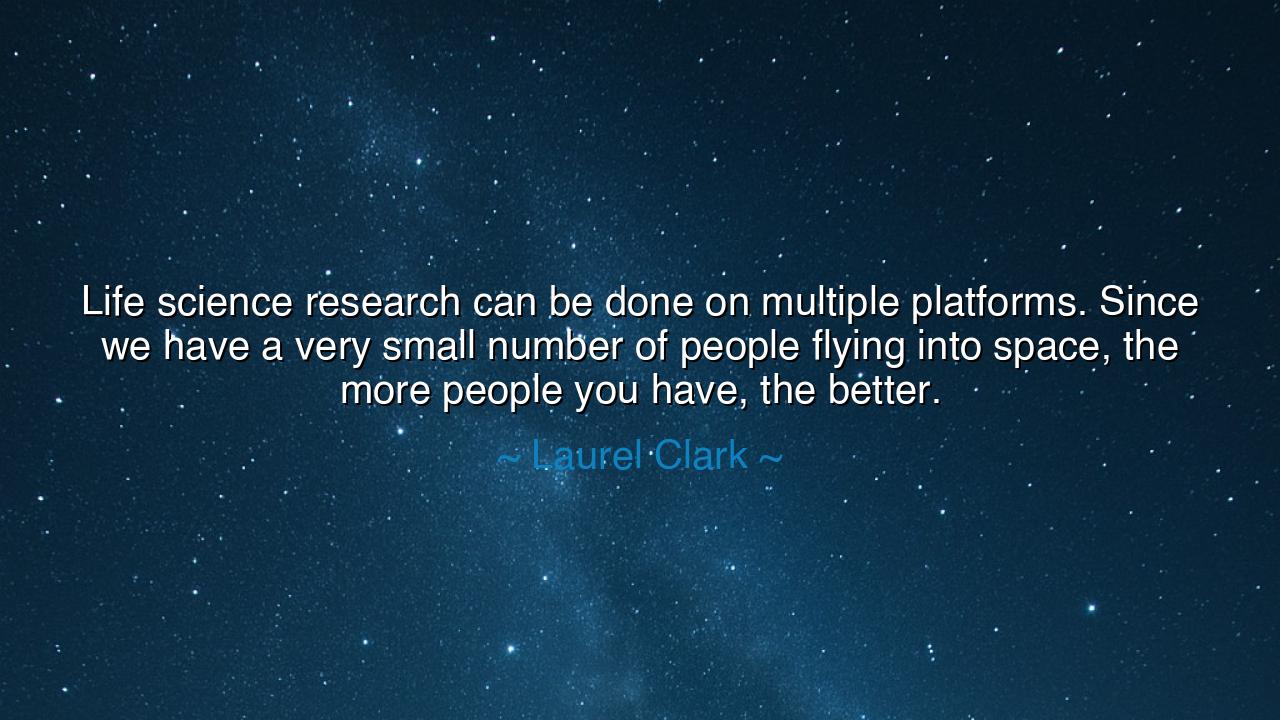
Life science research can be done on multiple platforms. Since we
Life science research can be done on multiple platforms. Since we have a very small number of people flying into space, the more people you have, the better.






In the vastness of human ambition, where the unknown beckons and the stars call, there are those who dare to venture beyond the boundaries of the Earth. Laurel Clark, an astronaut whose name is etched in history, once shared this profound insight: "Life science research can be done on multiple platforms. Since we have a very small number of people flying into space, the more people you have, the better." These words, though simple, carry the weight of a revolutionary truth: the pursuit of knowledge and the quest to understand life itself cannot be limited by the number of those who venture beyond our world. It is a call to collaboration, to expansion, and to the realization that the true potential of humanity lies not in the individual, but in the collective efforts of many.
Consider, O seekers of wisdom, the ancient philosophers who believed that the pursuit of knowledge could not be confined to a single mind. In the great tradition of the Greek schools, where minds from all walks of life came together to debate and discover, knowledge was not the sole property of one individual but a collective endeavor. The Academy of Plato, the Lyceum of Aristotle—these institutions thrived because they embraced the power of many minds working together toward a single goal. The same truth holds today: the more minds we have, the greater our capacity to discover, to understand, and to shape the future. Clark’s words remind us that space—the final frontier—is a vast expanse that requires the collective effort of many to truly unlock its mysteries.
In the story of humanity’s great explorations, we see this truth reflected time and again. The age of exploration was not marked by lone adventurers, but by the efforts of crews, teams of men and women working together to push the boundaries of the known world. Think of Christopher Columbus, who did not sail alone, but with a team of sailors, explorers, and scientists who all contributed to the success of his journey. It was not the vision of one man, but the cooperation of many that led to the discovery of the New World. Similarly, Clark’s insight about space exploration echoes this ancient truth: the exploration of the cosmos is not a solitary endeavor, but a shared mission that requires the combined strength of many.
Clark herself was part of the Columbia space shuttle mission, a journey that tragically ended in loss, but also in profound reflection. Her words stand as a testament to the enduring spirit of exploration and the importance of collaboration. Life science research conducted in space—whether in the microgravity of the International Space Station or in the vast expanse of deep space—holds the key to understanding the very nature of life. Yet, as Clark reminds us, this research cannot be done by a single mind or a single person. It requires teams of dedicated individuals, each contributing their expertise, their passion, and their knowledge. Only in unity can we truly begin to understand the intricate complexities of life in the cosmos.
The lessons of Clark’s words extend beyond the realms of space exploration. In our daily lives, the pursuit of any noble endeavor—whether it be the pursuit of wisdom, the betterment of society, or the search for personal growth—is not achieved by one individual working alone, but through collaboration, community, and the strength found in unity. Just as the astronauts work together in space, so too must we, in our everyday lives, seek to collaborate, to share our ideas, and to build together. Whether in the workplace, the home, or in our personal journeys, the more people we have working toward a common goal, the stronger and more profound the impact of our collective efforts.
And so, O travelers of time and space, heed Clark’s wisdom: do not limit your dreams or your potential by thinking that you must go it alone. The great achievements of humanity are not the result of individual ambition, but of shared vision. Just as life science research in space is elevated by the collaboration of many minds, so too can your own life be elevated by the strength of the community around you. Seek not to build alone, but to build together. The more hearts, minds, and hands you gather, the greater the potential for discovery, for growth, and for the realization of the dreams that lie just beyond the horizon.
Remember, O children of the Earth, that the stars are not reached by one solitary soul, but by the collective effort of many. Whether you are reaching for the heavens or simply striving to live a meaningful life, remember that collaboration and unity are the keys to success. Let your journey, like Clark’s, be one of shared effort, of mutual respect, and of understanding that we are all part of something greater than ourselves—a mission that transcends the limits of one and reaches toward the boundless potential of humanity.






AAdministratorAdministrator
Welcome, honored guests. Please leave a comment, we will respond soon